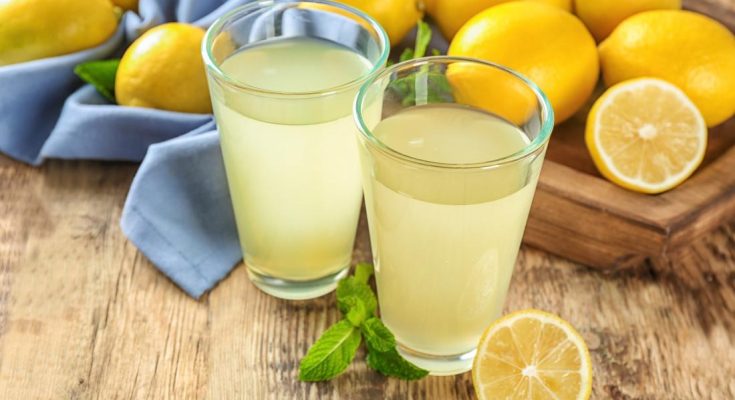If you are looking for a great way to maintain your health and fitness, you should consider taking organic lemon juice daily. It has several health benefits, including preventing dehydration, absorbing iron from foods you eat, and providing antioxidants.
Vitamin C
Organic lemon juice contains a lot of vitamin C. This vitamin can be used to fight a variety of diseases. It can also be useful in healing wounds.
Vitamin C helps boost immunity and is important for bone formation. Lemons are packed with other vitamins and minerals, such as folate, calcium and magnesium. Some studies have found that eating lemons may reduce the risk of heart disease, kidney stones, and digestive problems. However, it is a good idea to get your vitamin C from other sources.
Besides being a good source of vitamin C, lemons are high in soluble fiber. Fibre helps regulate bowel movements, softening your stool and preventing constipation.
A recent study showed that consuming a high-fibre diet can lower your risk of colorectal cancer by more than 30 percent. The same study also showed that lemons contain flavonoids. These antioxidants can reduce the risk of stroke.
Lemons are also a good source of manganese, zinc, and iron. These trace elements are essential for proper nerve function and muscle function. They help protect the LDL cholesterol from oxidation.
Citrus fruits also contain flavonoids. Studies have shown that women who consume more flavonoids may have a lower risk of ischemic stroke. Fildena 100 Mg And Fildena 200 Mg.
Lemons are also a great source of potassium, which is a vital mineral for nerves and muscles. Potassium also helps prevent muscle cramps. If you have a cold, you can drink lemon juice to soothe your symptoms.
Besides boosting your immune system, lemons are also beneficial for your skin. The antioxidants in lemon juice can neutralize free radicals and prevent them from damaging your body.
Lemons also have antibacterial and antifungal properties. Drinking a glass of lemon juice can help clear up blackheads and dandruff.
Antioxidants
Lemons contain flavonoids, which are antioxidants that help protect our bodies from damage caused by free radicals. These antioxidants may also help reduce inflammation. They also help to prevent certain types of cancer.
Vitamin C is one of the most important antioxidants in lemon juice. It helps our immune system to fight off infections and boosts its ability to produce white blood cells. A high intake of vitamin C can also help treat a variety of diseases including gum disease, osteoporosis, and Alzheimer’s.
In addition to the well-known vitamin C, lemons are also loaded with flavonoids. The citric, malic, and lactic acids in lemon juice have been found to help promote the secretion of bile and urinary tract fluids. And they are also believed to help prevent kidney stones.
Some studies have shown that consuming organic lemon juice may reduce the risk of bowel cancer. This is because the flavonoids in lemon juice can inhibit the onset and progression of certain inflammatory conditions.
Organic lemon juice is also known to be an effective antimicrobial. In a study, researchers discovered that the fruit was able to suppress the growth of leukemia cells. Another study showed that lemons had antibacterial properties against pathogenic bacteria.
Besides the usual vitamins and minerals, the fruit is also a rich source of phytonutrients, antioxidants, and flavonoids. This combination of nutrients can lead to enormous benefits.
One lemon contains 21% of the recommended daily value for vitamin C. Compared to other fruits and vegetables, lemons have a low sugar content. Sugar has been linked to a number of chronic conditions.
Lemons are also a good source of fibre. Fiber is essential for healthy digestion. Lack of fibre can result in constipation and other digestive problems.
also read – Top 5 Ultimate Guide on Applying to Study Abroad in Canada
Prebiotics
The prebiotics in organic lemon juice are not only beneficial to your gut, but they also provide various health benefits. It’s important to maintain a balanced gastrointestinal system to ensure a healthy body overall.
Prebiotics are non-digestible dietary fibers that can promote the growth of good bacteria in the gut. They can also help with the absorption of certain minerals.
Some of the most commonly consumed foods that contain prebiotics are yogurt, tempeh, and sauerkraut. However, it’s important to remember that these foods are not completely healthy. In fact, some may have high levels of bad bacteria.
If you have been diagnosed with irritable bowel syndrome, it’s a good idea to talk to your doctor before taking any prebiotics. This can prevent you from experiencing side effects.
Taking probiotics is also a great way to improve your mood. They can also reduce constipation and improve digestion. Plus, they can help your immune system.
When you drink lemon water, the antioxidant properties of vitamin C can have a calming effect on your nerves. Vitamin C is also a natural antimicrobial. And it can help with your skin’s elasticity.
Another way to get more prebiotics into your diet is to eat healthy cabbage. Sauerkraut is full of beneficial bacteria. So, try eating it along with your other healthy foods.
Lemons are also rich in pectin, which acts as a food source for your gut bugs. Pectin can encourage the growth of good gut bacteria and protect the digestive tract.
A number of studies have shown that eating lemons can have a positive impact on your health. Not only does it help with your immune system, it can decrease inflammation in your gut.
Increased fluids prevent dehydration
Increased fluids in organic lemon juice may be the answer to your dehydration woes. This is because the citrus fruit contains a number of nutrients including vitamin C.
Moreover, it helps the body produce hormones and collagen. It also helps the body absorb iron. For example, if your body does not have sufficient water it will not be able to absorb iron.
A good way to consume organic lemon juice is to add it to room temperature water. However, it is important to drink this beverage in moderation. You should also make sure you rinse your mouth with plain water after you finish.
Despite the fact that it is no magic wand, you can prevent dehydration by drinking a glass of organic lemon juice every day. Another good idea is to store it in your refrigerator.
In terms of preventing dehydration, it is important to know that it happens to everyone, even people who are young and healthy. If you are sick or pregnant, you are at a higher risk of becoming dehydrated.
Dehydration can be a serious medical condition. Without proper treatment, it can lead to kidney failure and death. The risk is especially high in older adults. Additionally, dehydration can be caused by fever or vomiting.
There are many ways to rehydrate yourself. One of the best ways to do this is to use the oral rehydration solution. These fluids contain glucose in specific concentrations. They can be used by infants and older adults to replace lost fluids.
Other strategies for ensuring hydration include using a straw, adding ice cubes made of fresh fruit, and drinking more water. Finally, keep a bottle of water handy for when you need to hydrate.
Helps absorb iron from the foods you eat
Iron is a vital mineral that helps keep your body healthy. It is used as the building block for hemoglobin, a protein that shuttles oxygen around the body. However, there are several foods that can inhibit iron absorption. Therefore, it is important to know which foods to eat and which to avoid.
Foods high in vitamin C and beta-carotene can help boost your body’s ability to absorb iron. Vitamin C, also known as ascorbic acid, is a powerful antioxidant that increases the absorption of both heme and non-heme iron. Ascorbic acid can be found in oranges, strawberries, cantaloupe, and many other foods.
There are also certain proteins and micronutrients that can interfere with the body’s ability to absorb iron. Some examples include phytates, oxalates, and polyphenols. While these compounds can be found in a variety of foods, the best way to ward off their harmful effects is to eat plenty of food high in vitamin C.
If you want to ensure that your diet is rich in iron, consider eating lean meat, seafood, and poultry. Lean meat includes skinless boneless chicken breasts and turkey. In addition, a few types of shellfish are a good source of iron.
Vitamin A is another beneficial nutrient that can increase the absorption of iron. Several foods can provide this vitamin, including carrots, sweet potatoes, and spinach. Vitamin A plays a vital role in vision, bone health, and immune system function.
For maximum iron absorption, consider pairing non-heme iron with vitamin C. Foods like spinach, broccoli, and brussels sprouts contain both of these nutrients.
Tofu and beans are also excellent sources of iron. These foods can be a good substitute for poultry or red meat. Soak these foods properly before cooking to remove the phytic acid.




